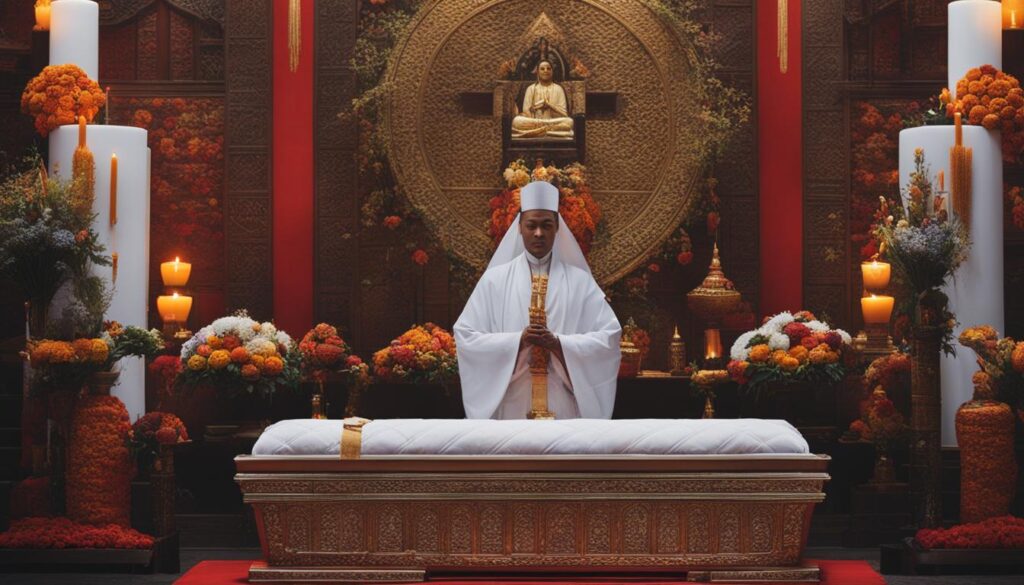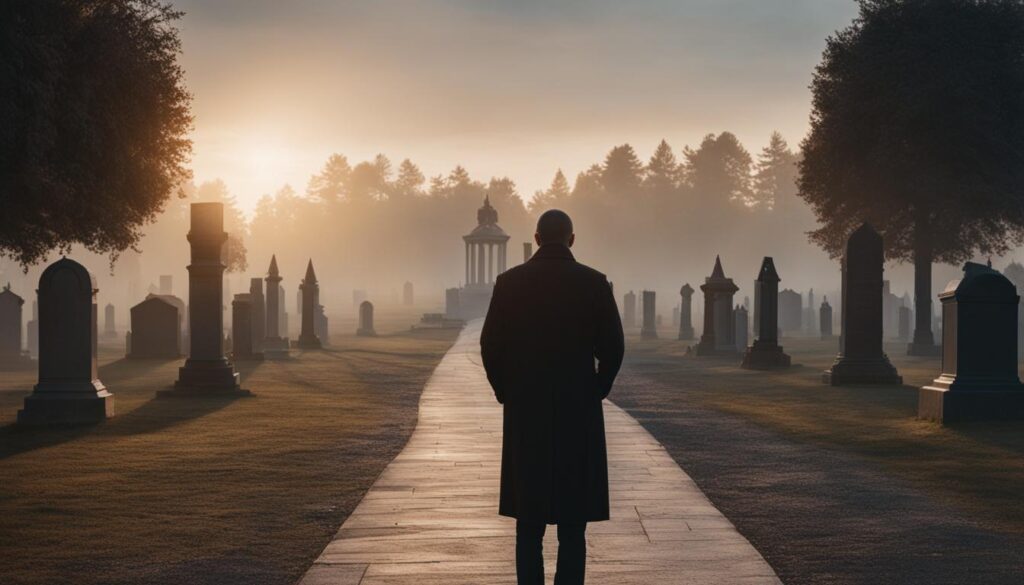We may earn money or products from the companies mentioned in this post.
Funeral customs have played a significant role in various cultures throughout history. Different cultures have their unique ways of mourning the deceased, shaping their funeral customs, and traditions. In this section, we will explore the significance of religious funeral customs in various cultures. We will delve into the traditions and rituals that are practiced during funerals and their cultural importance.
Key Takeaways
- Religious funeral customs vary across different cultures.
- Traditional funeral rituals hold significant importance in the commemoration of life.
- Religious funeral traditions play a vital role in providing comfort and solace to the immediate family of the deceased.
- Funeral customs reflect cultural beliefs and values, providing insight into diverse grief rituals.
- Understanding religious funeral customs is essential in developing greater empathy and appreciation for the cultural diversity that exists in the commemoration of life.
Funeral Customs and Traditions in Christianity
Christianity is a religion that places great emphasis on the afterlife and the resurrection of the body. As a result, funeral practices are significant and deeply rooted in religious beliefs and traditions.
Christian funerals are typically held in a church or chapel, and the service is conducted by a priest or minister. The ceremony includes prayers, hymns, and readings from the Bible. Many Christian funerals include a eulogy or tribute to the deceased, which is delivered by a family member or friend.
One of the most significant religious funeral practices in Christianity is the Communion or Eucharist. This is a sacrament that involves the consumption of bread and wine, which are believed to represent the body and blood of Jesus Christ. The Communion is often used to symbolize the unity of the deceased with Christ and his promise of eternal life.
Another essential aspect of Christian funeral customs and rituals is the burial or cremation of the body. Christians view the body as a sacred vessel that should be treated with respect and dignity. Burial is the most common method of disposing of the body, and it is often accompanied by prayers, hymns, and readings from the Bible. Cremation is also becoming more common among Christians, but it is generally less popular than traditional burial.
Religious Funeral Ceremonies
Christian funeral ceremonies are typically solemn and respectful, reflecting the belief that death is a transition from earthly life to eternal life with God. The focus of the service is on the deceased, their life, and their relationship with God.
One significant event that occurs during a Christian funeral ceremony is the Rite of Christian Burial. This ceremony includes the final commendation, which is a prayer that asks God to receive the deceased into heaven. It is followed by the farewell rite, which involves the sprinkling of holy water on the casket or urn. This symbolizes the cleansing of the soul and the hope for eternal life.
Christian Funeral Practices
Christian funeral practices vary by denomination and location. However, there are certain practices that are common among all Christians. These include:
- Prayers for the deceased and their family
- Readings from the Bible
- Hymns and spiritual music
- A eulogy or tribute to the deceased
- The Communion or Eucharist
- Burial or cremation of the body
“For God so loved the world, that he gave his only begotten Son, that whosoever believeth in him should not perish, but have everlasting life.” – John 3:16
Christian funeral customs and traditions reflect the belief in the resurrection of the body and the promise of eternal life with God. They provide comfort and solace to the bereaved, as they celebrate the life of the deceased and their journey to the afterlife.
Funeral Customs and Traditions in Islam
Funeral customs and beliefs in Islam are centred around the belief in the afterlife, where the body is seen as a vessel that carries the soul to judgment and eternal life. According to Islamic tradition, the deceased should be buried as soon as possible, preferably within 24 hours of death.
Family members and close friends typically wash and wrap the body in a white shroud called kafan, and a special prayer called Salat al-Janazah is performed at the mosque. This prayer is led by an imam, and it is attended by the community members who pay their respects and offer condolences to the family.
A common tradition in Islam is to bury the deceased facing the holy city of Mecca, as it is believed that this will help guide the soul towards the afterlife. The graves are marked with simple headstones and are often adorned with flowers, incense, and candles.
In Islam, there is no embalming, cremation, or open casket viewings, as the body is seen as sacred and should be treated with utmost respect. The focus of the funeral is on the spiritual journey of the soul and the remembrance of the deceased through prayer and acts of charity.
Overall, Islamic funeral rituals and customs reflect a deep reverence for the deceased and their spiritual journey after death.
Funeral Customs and Traditions in Hinduism
Hinduism is the third-largest religion in the world, and it has many unique funeral customs and traditions. In Hinduism, death is seen as a natural part of the cycle of life and rebirth, and the funeral rites are designed to release the soul from the cycle of reincarnation and allow it to attain moksha, or liberation from the cycle of birth and death.
One of the most important funeral customs in Hinduism is the cremation of the body. The body is typically cremated within 24 hours of death, and the ashes are then scattered in a sacred body of water, such as the Ganges River. This process is believed to release the soul from the body and allow it to move on to the next life.
Before the cremation, the body is washed and dressed in new clothes, and the family members offer prayers and perform rituals to ensure a peaceful transition for the departed. The body is then placed on a bamboo stretcher and carried to the cremation ground, where it is placed on a funeral pyre and set alight.
Along with the cremation, there are many other religious funeral customs and traditions in Hinduism. Family members usually wear white as a symbol of mourning and abstain from eating meat during the mourning period. The family also performs puja, or Hindu prayer rituals, for several days after the funeral to help ease the soul’s transition to the afterlife.
Comparison with Other Religions
While many religions place an emphasis on burial or cremation as a final farewell, the cultural funeral customs surrounding these practices can differ greatly. For example, Hinduism may differ from the Christian practice of embalming the deceased for an open-casket funeral.
| Religion | Funeral Customs |
|---|---|
| Hinduism | Body is cremated within 24 hours, and ashes are scattered in a sacred body of water; family members wear white as a symbol of mourning and perform puja. |
| Christianity | Body may be embalmed for an open-casket funeral; funeral service may include a eulogy, hymns, and prayers; burial or cremation is typical. |
| Islam | Body is washed and wrapped in a white cloth; funeral service is led by an imam and includes recitation of prayers; burial is typically within 24 hours. |
| Buddhism | Body may be cremated or buried; funeral service may include chanting and recitation of Buddhist scriptures. |
| Judaism | Body is washed and dressed in a simple white shroud; funeral service may include prayers, readings from the Torah, and eulogies; burial is typically within 24 hours. |
While there are many differences among the funeral customs and traditions in these religions, they all share the common goal of honoring and remembering the deceased with respect and reverence.
Funeral Customs and Traditions in Buddhism
Buddhism is a religion that has a unique approach to death and funerals. According to Buddhist beliefs, death is a natural and inevitable part of life, and it is viewed as a transition from one life to another. Buddhist funerals focus on the spiritual journey of the deceased and aim to provide a peaceful and respectful transition.
Buddhist Funeral Practices
Buddhist funeral practices vary depending on the sect of Buddhism that is observed. However, there are some common practices that are typically followed across most sects.
- Inviting monks to conduct the funeral service
- Recitation of Buddhist scriptures and prayers
- Offerings of flowers, incense, and candles
- Chanting of mantras and sutras
- Placing of a Buddha image or portrait of the deceased
- Symbolic gestures of respect and gratitude, such as bowing and prostrating
Buddhist funerals are typically held within a week of the deceased person’s passing. The funeral service can take place at a temple or at the family home.
Buddhist Funeral Customs
Buddhist funeral customs are centered around the notion of impermanence and the belief that death is just another stage in the cycle of life. One of the most significant customs is the creation of a monk’s robe, which is typically made from the deceased person’s clothing. This symbolizes the transformation of death and the rebirth of the soul.
Another common custom is the ringing of a bell. The bell is rung to signify the beginning and end of the funeral service and to remind people of the impermanence of life.
Buddhist Funeral Rituals
Buddhist funeral rituals aim to provide comfort and support to the deceased person’s loved ones and to help the soul transition to the afterlife. One of the most important rituals is the lighting of candles. This symbolizes the light of the Buddha and is believed to guide the soul to the afterlife.
Another important ritual is the offering of food to the monks. This is done to show respect and gratitude to the monks who are leading the funeral service.
“The Buddhist approach to death and funerals is rooted in the belief of impermanence and the cycle of life. Buddhist funerals aim to provide a peaceful and respectful transition for the deceased person’s soul.”
Funeral Customs and Traditions in Judaism
Judaism is a religion that values tradition, and the funeral customs and traditions reflect this emphasis. The customs and rituals associated with Jewish funerals have evolved over centuries, and they reflect respect for the deceased and provide comfort for the bereaved.
Burial and Mourning Period
Jewish law requires prompt burial, typically within 24 hours of death. Following death, the body is prepared for burial by ritual washing, and then it is clothed in a plain white shroud.
During the funeral service, the casket remains closed until after the eulogy, at which point it is covered with earth by the mourners. Following the funeral, the mourning period begins, known as “shiva.” During shiva, the immediate family sits low to the ground on simple cushions, and visitors come to pay their respects. The shiva lasts for seven days, during which time the family abstains from work, and friends and community members provide meals.
Religious Funeral Customs
Jewish funeral customs are rooted in Jewish law and tradition, and they aim to pay respect to the deceased while providing comfort to the bereaved. The funeral service, known as the “levayah,” is typically held in a synagogue and led by a rabbi. The service includes the reading of psalms, prayers, eulogies, and the lighting of candles.
Additionally, a custom unique to Jewish funerals is the tearing of garments by the mourners. This act symbolizes the grief and mourning of the family and serves as a physical manifestation of their loss. Another custom is the use of white stones to mark the grave, emphasizing the simplicity and purity of the burial.
Cultural Funeral Customs
Jewish culture places a strong emphasis on community, and this is reflected in the funeral customs as well. The shiva period is a time for the community to come together and provide support and comfort to the bereaved family. During this time, it is customary for visitors to bring food and to share stories and memories of the deceased.
Another cultural custom is the practice of erecting a monument on the grave. This monument serves as a physical reminder of the deceased and provides a place for family members to grieve and remember their loved one.
“May the Lord comfort you among the mourners of Zion and Jerusalem.”
Overall, Jewish funeral customs and traditions are deeply rooted in Jewish law and tradition. The customs reflect the importance of community and respect for the deceased, while also providing comfort and support for the bereaved.
Conclusion
Religious funeral customs, funeral customs and traditions, as well as religious funeral practices play a significant role in honoring the deceased and providing comfort to the bereaved. Throughout different cultures, these customs have evolved and become integral to the grieving process.
Understanding and respecting these traditions allows us to gain a deeper insight into the diverse ways in which different communities commemorate life and mourn those who have passed on. By appreciating the significance of these practices, we can extend our empathy and support to those who are grieving.
Religious funeral customs are a rich part of cultural heritage that we must embrace and respect. The rituals, practices, and customs associated with religious funerals are not only a tribute to the deceased but also provide solace and comfort to their loved ones.
As we continue to strive towards greater social and cultural diversity, it is imperative that we promote inclusivity and acceptance of religious funeral customs and traditions. By acknowledging and understanding their relevance, we can build bridges between cultures and communities, and foster a greater sense of unity and respect.
FAQ
What are religious funeral customs?
Religious funeral customs are the practices, rituals, and traditions associated with funerals in different religious beliefs and cultures. These customs hold significant cultural and spiritual importance and vary based on the religion and cultural traditions.
What is the significance of religious funeral customs?
Religious funeral customs hold deep meaning and provide a way for communities to honor and remember the deceased. They often offer comfort and solace to the bereaved and provide a framework for navigating the grieving process within the context of religious beliefs and traditions.
How do funeral customs differ across different cultures?
Funeral customs vary greatly across different cultures due to religious beliefs, cultural practices, and historical traditions. Each culture has its own unique way of commemorating the deceased, conducting rituals, and expressing grief.
What are some common funeral customs and traditions?
Common funeral customs and traditions include holding memorial services or ceremonies, conducting burial or cremation rituals, offering prayers or religious readings, displaying symbols or religious artifacts, observing mourning periods, and coming together as a community to support the bereaved.
How can understanding religious funeral customs benefit individuals and communities?
Understanding religious funeral customs can foster empathy, cultural appreciation, and respect for diversity. It allows individuals and communities to navigate the grieving process, support one another, and honor the deceased in a manner that is sensitive to religious and cultural beliefs.
Are religious funeral customs mandatory?
The observance of religious funeral customs is generally a personal and communal choice. While some individuals and families choose to adhere strictly to religious funeral customs, others may decide to incorporate elements of these customs based on their personal preferences and circumstances.
Can religious funeral customs be adapted to modern times?
Yes, religious funeral customs can be adapted to modern times while still maintaining their core essence and significance. As societal norms and technological advancements evolve, individuals and communities may find ways to incorporate new practices and technologies into traditional funeral customs.
Are religious funeral customs only observed by individuals who practice the respective religion?
While religious funeral customs are primarily associated with specific religious beliefs, they can be observed and respected by individuals from all walks of life. Funerals often serve as an opportunity for people to come together, show support, and respect the customs and traditions of the deceased and their loved ones.
Affiliate Disclosure: This post may contain affiliate links. If you purchase through our link, we may receive a small commission, but at no additional cost to you. For more information, please see our Disclosure statement.



